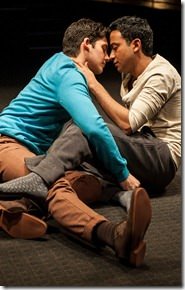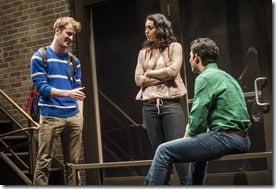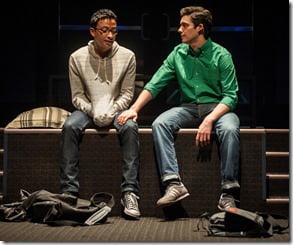Teddy Ferrara
Directed by Evan Cabnet
Produced by the Goodman Theater, Chicago
This unwieldy Shavian social drama feels more like an after-school special.
From Lillian Hellman’s The Children’s Hour to Tony Kushner’s Angels in America, queer dramatists have often written from the perspective of marginalized outsiders, tepidly unsure of their place in society. In fact, much of what we call “queer aesthetics” was forged in the furnace of perceived social persecution, as GLBTQ writers sought to find a redeeming beauty or even grace from within a decidedly alienated vantage point. That Christopher Shinn’s Teddy Ferrara, which opened at the Goodman Theater this month, turns an incredulous and conscious eye to this received narrative tradition of “queer victimhood” is its greatest strength; that if fails to offer up new alternatives for queer storytelling is its greatest weakness.
Set at a large state university, Teddy Ferrara traces the effects of a recent “gay suicide” on the broader campus. Gabe (Liam Benzvi), head of the Queer Students Group, finds himself caught in the crosshairs of a strident campus activism, university bureaucracy, and media uproar. Unwilling to appropriate the death of fellow student Teddy Ferrara (Ryan Heindl) to his own ideological purposes, Gabe finds himself on the outside looking in as the details of Teddy’s private life are turned into political fodder and opportunities for cheap grandstanding. The problem with Teddy Ferrara, unfortunately, is that Shinn doesn’t quite know how to effectively dramatize the questions he wants to ask. Gabe alone is willing to doubt the usefulness of branding queer students as “victims” of social oppression (especially when the facts are vague), but like any young man his age, he is prone to bouts of equivocation. Thus the play’s moral compass teeters north-north-west, and we are left with more questions than have been sufficiently answered.
To boot, at two hours and forty minutes, Teddy Ferrara is about an hour too long. Shinn has made a name for himself as a dramatist of taut psychological dramas, but here with a cast of thirteen, Shinn may be straying too far from his natural abilities. The result is an unwieldy structural mess. Subplots are written in and then fizzle out. Developments in character are alluded to and then never picked up again. At one point, Gabe’s ex-boyfriend Drew (Adam Poss), editor of the campus newspaper, seduces Gabe’s best-friend Tim (Josh Salt). The scene—straight out of an episode of 90210—is replete with tawdry, awkward dialogue about being hard, and adds only a tangential complication to the play’s main arc. Thus what could have been an immensely effective two or three person play—perhaps honing in on the effect of Teddy’s death on Gabe and Drew’s relationship—sprawls out into a facile Shavian social drama.
Indeed, the shear size of Shinn’s canvas forces him to paint in only the broadest of brushstrokes, often at the expense of a nuanced depth of character. And although performances from this predominantly young ensemble are solid, they’re never quite able to lift Shinn’s two-dimensional types into full relief. Much of the play’s dialogue is mired down in an ungainly “young person speak”—the kind you hear in after-school specials—and its wooden attempts to capture the inexperience of youth make these college-aged young adults sound more like sexually promiscuous, drunken middle-schoolers. Furthermore, there is a heavy preponderance of text conversations and IM chats, all of which are about as dramatic as shouting at a random passerby on the street.
In the last analysis, I find myself sympathetic to Shinn’s project. As DOMA goes to the Supreme Court and as states for the first time reject constitutional amendments banning gay marriage, insisting too stridently on inherited narratives of “queer victimhood” feels forced and disingenuous. Queer people—no longer uniformly marginalized to the closet—have an opportunity to recast themselves as committed agents of social change. The implications for queer storytelling are immense. Unfortunately, Teddy Ferrara doesn’t quite pick up on them.
SOMEWHAT RECOMMENDED
Anthony J. Mangini
Reviewed Wednesday, February 20th, 2013.
Running time is 2 hours 40 minutes with one intermission.
Teddy Ferrara runs until March 3rd, 2013. Goodman Theater is located at 170 North Dearborn. Tickets can be obtained through their box office at (312) 443-3800 or at their website (https://www.goodmantheatre.org//). Half-price tickets are available at Theater in Chicago: https://www.theatreinchicago.com/teddy-ferrara/5760/.




